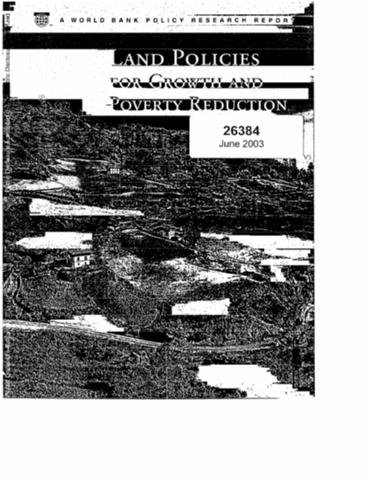Oxford University Press is the largest university press in the world, publishing in 70 languages and 190 countries. Our Global Academic Publishing program spans the entire academic and higher education spectrum, including a wide array of scholarly and general interest books, journals, and online products.
Mission
At OUP, we believe in the power of the written word and the scholarship that stands behind it. Everything we publish relates directly to our mission: to support Oxford University's objective of excellence in research, scholarship, and education. As a press, we take pride in this mission, which allows us to enable, support, and facilitate research and scholarship.
Members:
Resources
Displaying 26 - 28 of 28Land Policies for Growth and Poverty Reduction
Land policies are of fundamental importance to sustainable growth, good governance, and the well-being of, and the economic opportunities open to, both rural and urban dwellers - particularly the poor. To this end, research on land policy, and analysis of interventions related to the subject, have long been of interest to the Bank's Research Department, and other academic, and civil society institutions.
Land Policies for Growth and Poverty Reduction
Land policies are of fundamental importance to sustainable growth, good governance, and the well-being of, and the economic opportunities open to, both rural and urban dwellers - particularly the poor. To this end, research on land policy, and analysis of interventions related to the subject, have long been of interest to the Bank's Research Department, and other academic, and civil society institutions.
The Urgency of Land and Agrarian Reform in Rwanda
The challenges which lie ahead for post-genocide Rwanda's economic, social and political development are closely related through the issue of land. The pressure from a high rate of population growth, added to the paucity of economic opportunities outside the agricultural sector, is forcing people off the land and into poverty. Society is under extreme stress. Over the last decade the fabric of Rwandan society has been torn, resulting in ethnic and social divisions which culminpted in the events of 1994. Since then, new groups have entered the competition for land.




